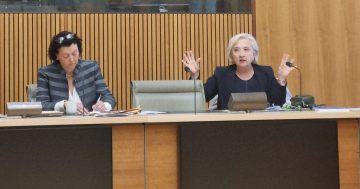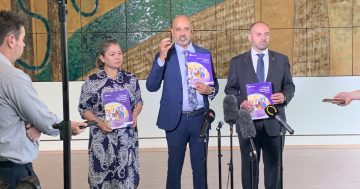
Group of business workers screaming to stressed partner at the office. Photo: Aaron Amat.
Do we need more proof that the ACT Government has either no regard or no understanding of and for the self-employed?
They’ve just “strengthened the Territory’s work health and safety laws to better protect workers from workplace psychosocial hazards”. It seems they’ve implemented the discredited Boland Review recommending employers be responsible for the mental health of other people.
Protecting workers from psychosocial hazards is essential in this day and age. But the so-called strengthening makes small workplaces less safe when it comes to the management of mental health.
For example, if there are five people in a workplace and we only talk about the mental health of four of them, do we not fail those four people? If the employer has a mental health problem, will that not worry the four employees? Would they not be concerned for their employer, their jobs, their income and their own future mental health?
And small business owners have a mental health crisis – one that the ACT Government and Safe Work Australia and WorkSafe ACT either don’t know about or don’t care about. A federal Treasury report released earlier this year shows the crisis facing millions of small business owners – including those in the ACT.
Part of the Treasury report states, “22 per cent — just over one in five — small business respondents reported having been diagnosed with a mental ill-health condition by a doctor or health professional”.
It also highlights that: “More than one-third of small business respondents from the manufacturing (36 per cent), retail trade (34 per cent), accommodation and food services (34 per cent) industries had received a medical diagnosis of mental ill-health.”
In the ACT, we have some 34,000 self-employed human beings. These figures show that around 7000 have been diagnosed with a mental health problem. That’s not OK.
This outcome shows the failure not just of governments but of those responsible for health policy, including Safe Work Australia, which supports the Boland Report.
The first consideration of any report should be the potential mental health impact on people — all people – whether they be the unemployed, international students, those with disabilities, the poor, or those in the middle and the self-employed. Governments have an absolute duty to do the right things by people.
But let’s look closely at Safe Work Australia (SWA).
This organisation writes OH&S policy for all Australian workplaces but never considers the health of the more than two million Australians who lead most of them. SWA, in a recent survey of staff satisfaction, came in at 51 per cent – well below average for the public service.
The organisation that writes OH&S policy and demands that employers treat their staff well fails its own test. They don’t have the credentials or experience to do their job.
When I expressed concerns with SWA about the lack of understanding of the self-employed, I was told by their then-CEO that a self-employed person is legally responsible for their own mental health.
How? If a contractor is diagnosed with a mental health disorder will we fine them or call in the regulators?
It’s a fact that the self-employed are put under constant stress by overly complicated policies designed by people who don’t get it. Removing complexity is better than adding to it.
The ACT Government was the first to implement the recommendations of the Boland Report and, as a result, small business people in the ACT are in further danger of being regulated out of existence.
But the issues don’t stop with OH&S and IR — the Australian Human Rights Commission (AHRC) is a further example of failure to consider the wellbeing of small business owners.
Some years ago, I received a phone call from the AHRC demanding that I get small businesses involved in a mentally healthy workplace program. I asked, “does the AHRC care about the mental health of the self-employed?” After a long pause, the response was, “I’ll have to check”. This absence of any focus on the health of the self-employed amounts to discrimination by the AHRC itself.
Will the ACT Human Rights Commissioner come out and fight for the human rights and mental health rights of 34,000 people?
Will Mick Gentleman, the Minister responsible, explain why the mental health of the self-employed don’t count? Or will he claim to have been poorly briefed?
Peter Strong was a Canberra business owner and CEO of the Council of Small Business Australia (COSBOA) for 11 years. He now consults on community economics.
Original Article published by Peter Strong on Riotact.











